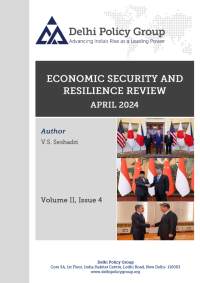Economic Security and Resilience Review
Date: May 05, 2024
This month’s ESRR tracks several high level visits during the month that impact the evolving global economic security landscape.
President Joe Biden of the US and Prime Minister Fumio Kishida of Japan, at their summit meeting held on April 10, 2024, agreed to a range of initiatives that will further advance their strategic cooperation, including on economic security. The trilateral Japan-Philippines-United States summit held on April 11 also resulted in the launch of new cooperative ventures, including the Luzon economic corridor to be undertaken in the Philippines. Both Summits addressed coercive pressures emanating from China.
That President-elect Prabowi Subianto of Indonesia chose China as the first foreign country to visit drew considerable attention. During his meeting with President Xi Jinping, he voiced full support for the development of closer ties between Indonesia and China. Of interest here are also the findings of an ISEAS opinion survey conducted earlier this year, indicating that more South East Asians would now prefer to align with China (50.5%) over the US (49.5%) if ASEAN nations were forced to choose between them. Notably, the preference towards China was the highest in Malaysia (75.1%), followed by Indonesia (73.2%) and Laos (70.6%).
This issue of ESRR also examines the outcomes of high level visits exchanged between the EU and China, and between the United States and China. German Chancellor Olaf Scholz’s visit to China, in which he was also accompanied by a large business delegation ,was conciliatory in tone and aimed at securing more market access for German companies in China. In contrast, the EU Commission during the month launched subsidy probes on Chinese solar panels and wind turbines, began investigations on Chinese public procurement practices for medical devices, and raided the offices of the Chinese company NUCTECH in Poland and The Netherlands.
US Treasury Secretary Janet Yellen’s visit to China from April 5-9, 2024, saw her highlighting the issue of Chinese industrial overcapacity, particularly in the areas of NEVs and solar energy. The US launched an investigation into China’s ship building, maritime and logistics sectors, while President Biden asked the USTR to consider tripling the existing tariff rates on China’s steel and aluminium imports into the US.
Finally, this ESRR issue covers the critical minerals summit held in New Delhi from April 29-30, 2024, as well as key international investment trends outlined in a new UNCTAD report on ‘Global economic fracturing and shifting investment patterns’.
These and certain other developments covered in this month’s ESRR can be viewed at ESRR, Vol. II, Issue 3.
To read this ESRR, Vol. II, Issue 4, please see the PDF attached.
President Joe Biden of the US and Prime Minister Fumio Kishida of Japan, at their summit meeting held on April 10, 2024, agreed to a range of initiatives that will further advance their strategic cooperation, including on economic security. The trilateral Japan-Philippines-United States summit held on April 11 also resulted in the launch of new cooperative ventures, including the Luzon economic corridor to be undertaken in the Philippines. Both Summits addressed coercive pressures emanating from China.
That President-elect Prabowi Subianto of Indonesia chose China as the first foreign country to visit drew considerable attention. During his meeting with President Xi Jinping, he voiced full support for the development of closer ties between Indonesia and China. Of interest here are also the findings of an ISEAS opinion survey conducted earlier this year, indicating that more South East Asians would now prefer to align with China (50.5%) over the US (49.5%) if ASEAN nations were forced to choose between them. Notably, the preference towards China was the highest in Malaysia (75.1%), followed by Indonesia (73.2%) and Laos (70.6%).
This issue of ESRR also examines the outcomes of high level visits exchanged between the EU and China, and between the United States and China. German Chancellor Olaf Scholz’s visit to China, in which he was also accompanied by a large business delegation ,was conciliatory in tone and aimed at securing more market access for German companies in China. In contrast, the EU Commission during the month launched subsidy probes on Chinese solar panels and wind turbines, began investigations on Chinese public procurement practices for medical devices, and raided the offices of the Chinese company NUCTECH in Poland and The Netherlands.
US Treasury Secretary Janet Yellen’s visit to China from April 5-9, 2024, saw her highlighting the issue of Chinese industrial overcapacity, particularly in the areas of NEVs and solar energy. The US launched an investigation into China’s ship building, maritime and logistics sectors, while President Biden asked the USTR to consider tripling the existing tariff rates on China’s steel and aluminium imports into the US.
Finally, this ESRR issue covers the critical minerals summit held in New Delhi from April 29-30, 2024, as well as key international investment trends outlined in a new UNCTAD report on ‘Global economic fracturing and shifting investment patterns’.
These and certain other developments covered in this month’s ESRR can be viewed at ESRR, Vol. II, Issue 3.
To read this ESRR, Vol. II, Issue 4, please see the PDF attached.



